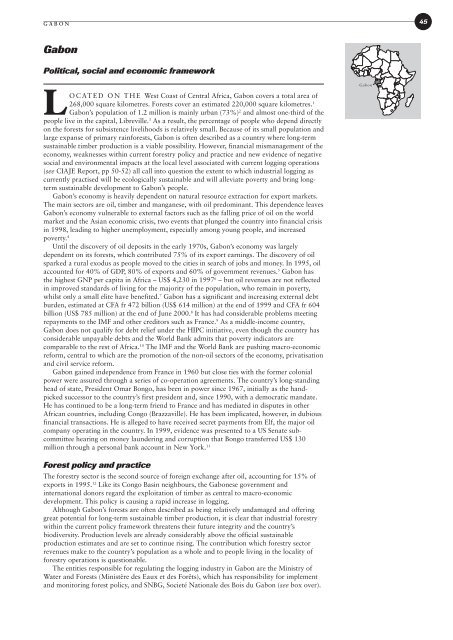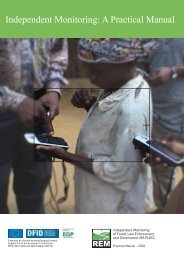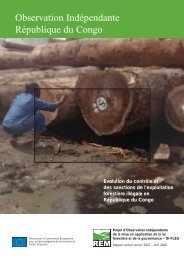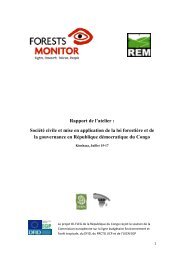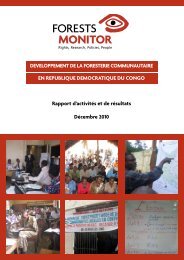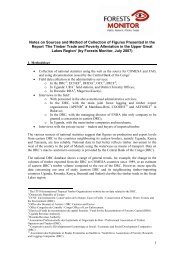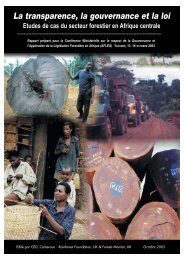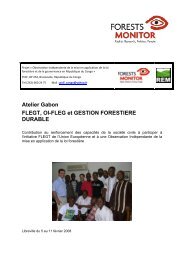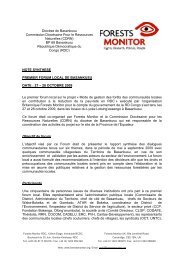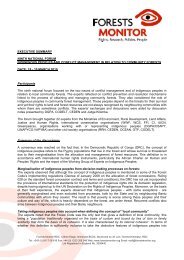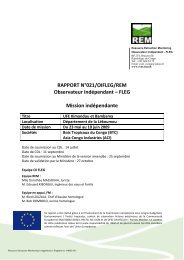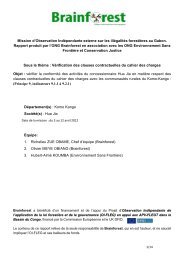Sold down the river - Salva le Foreste
Sold down the river - Salva le Foreste
Sold down the river - Salva le Foreste
You also want an ePaper? Increase the reach of your titles
YUMPU automatically turns print PDFs into web optimized ePapers that Google loves.
GABON 45GabonPolitical, social and economic frameworkLOCATED ON THE West Coast of Central Africa, Gabon covers a total area of268,000 square kilometres. Forests cover an estimated 220,000 square kilometres. 1Gabon’s population of 1.2 million is mainly urban (73%) 2 and almost one-third of <strong>the</strong>peop<strong>le</strong> live in <strong>the</strong> capital, Librevil<strong>le</strong>. 3 As a result, <strong>the</strong> percentage of peop<strong>le</strong> who depend directlyon <strong>the</strong> forests for subsistence livelihoods is relatively small. Because of its small population andlarge expanse of primary rainforests, Gabon is often described as a country where long-termsustainab<strong>le</strong> timber production is a viab<strong>le</strong> possibility. However, financial mismanagement of <strong>the</strong>economy, weaknesses within current forestry policy and practice and new evidence of negativesocial and environmental impacts at <strong>the</strong> local <strong>le</strong>vel associated with current logging operations(see CIAJE Report, pp 50-52) all call into question <strong>the</strong> extent to which industrial logging ascurrently practised will be ecologically sustainab<strong>le</strong> and will al<strong>le</strong>viate poverty and bring longtermsustainab<strong>le</strong> development to Gabon’s peop<strong>le</strong>.Gabon’s economy is heavily dependent on natural resource extraction for export markets.The main sectors are oil, timber and manganese, with oil predominant. This dependence <strong>le</strong>avesGabon’s economy vulnerab<strong>le</strong> to external factors such as <strong>the</strong> falling price of oil on <strong>the</strong> worldmarket and <strong>the</strong> Asian economic crisis, two events that plunged <strong>the</strong> country into financial crisisin 1998, <strong>le</strong>ading to higher unemployment, especially among young peop<strong>le</strong>, and increasedpoverty. 4Until <strong>the</strong> discovery of oil deposits in <strong>the</strong> early 1970s, Gabon’s economy was largelydependent on its forests, which contributed 75% of its export earnings. The discovery of oilsparked a rural exodus as peop<strong>le</strong> moved to <strong>the</strong> cities in search of jobs and money. In 1995, oilaccounted for 40% of GDP, 80% of exports and 60% of government revenues. 5 Gabon has<strong>the</strong> highest GNP per capita in Africa – US$ 4,230 in 1997 6 – but oil revenues are not ref<strong>le</strong>ctedin improved standards of living for <strong>the</strong> majority of <strong>the</strong> population, who remain in poverty,whilst only a small elite have benefited. 7 Gabon has a significant and increasing external debtburden, estimated at CFA fr 472 billion (US$ 614 million) at <strong>the</strong> end of 1999 and CFA fr 604billion (US$ 785 million) at <strong>the</strong> end of June 2000. 8 It has had considerab<strong>le</strong> prob<strong>le</strong>ms meetingrepayments to <strong>the</strong> IMF and o<strong>the</strong>r creditors such as France. 9 As a midd<strong>le</strong>-income country,Gabon does not qualify for debt relief under <strong>the</strong> HIPC initiative, even though <strong>the</strong> country hasconsiderab<strong>le</strong> unpayab<strong>le</strong> debts and <strong>the</strong> World Bank admits that poverty indicators arecomparab<strong>le</strong> to <strong>the</strong> rest of Africa. 10 The IMF and <strong>the</strong> World Bank are pushing macro-economicreform, central to which are <strong>the</strong> promotion of <strong>the</strong> non-oil sectors of <strong>the</strong> economy, privatisationand civil service reform.Gabon gained independence from France in 1960 but close ties with <strong>the</strong> former colonialpower were assured through a series of co-operation agreements. The country’s long-standinghead of state, President Omar Bongo, has been in power since 1967, initially as <strong>the</strong> handpickedsuccessor to <strong>the</strong> country’s first president and, since 1990, with a democratic mandate.He has continued to be a long-term friend to France and has mediated in disputes in o<strong>the</strong>rAfrican countries, including Congo (Brazzavil<strong>le</strong>). He has been implicated, however, in dubiousfinancial transactions. He is al<strong>le</strong>ged to have received secret payments from Elf, <strong>the</strong> major oilcompany operating in <strong>the</strong> country. In 1999, evidence was presented to a US Senate subcommitteehearing on money laundering and corruption that Bongo transferred US$ 130million through a personal bank account in New York. 11Forest policy and practiceThe forestry sector is <strong>the</strong> second source of foreign exchange after oil, accounting for 15% ofexports in 1995. 12 Like its Congo Basin neighbours, <strong>the</strong> Gabonese government andinternational donors regard <strong>the</strong> exploitation of timber as central to macro-economicdevelopment. This policy is causing a rapid increase in logging.Although Gabon’s forests are often described as being relatively undamaged and offeringgreat potential for long-term sustainab<strong>le</strong> timber production, it is c<strong>le</strong>ar that industrial forestrywithin <strong>the</strong> current policy framework threatens <strong>the</strong>ir future integrity and <strong>the</strong> country’sbiodiversity. Production <strong>le</strong>vels are already considerably above <strong>the</strong> official sustainab<strong>le</strong>production estimates and are set to continue rising. The contribution which forestry sectorrevenues make to <strong>the</strong> country’s population as a who<strong>le</strong> and to peop<strong>le</strong> living in <strong>the</strong> locality offorestry operations is questionab<strong>le</strong>.The entities responsib<strong>le</strong> for regulating <strong>the</strong> logging industry in Gabon are <strong>the</strong> Ministry ofWater and Forests (Ministère des Eaux et des Forêts), which has responsibility for imp<strong>le</strong>mentand monitoring forest policy, and SNBG, Societé Nationa<strong>le</strong> des Bois du Gabon (see box over).Gabon


